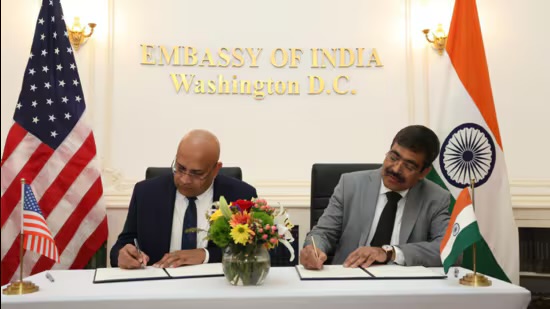The United States and India have taken a major step to strengthen their defense partnership by signing a Security of Supply Arrangement (SOSA). This agreement is designed to provide reciprocal priority support for defense goods and services between the two nations. The arrangement aims to ensure that both countries can rely on each other for critical industrial resources. Especially during times of unanticipated supply chain disruptions.
SOSA: Key Partnership for National Security
Vic Ramdass from the U.S. Department of Defense and Samir Kumar Sinha from India’s Defence Ministry signed a special agreement called SOSA on Thursday. This makes India the 18th country to join the U.S. in this kind of partnership. Along with countries like Australia, Canada, Israel, Japan, and the U.K.
Ramdass said this agreement is a big step forward in the defense relationship between the U.S. and India. He explained that SOSA will help make the Defense Technology and Trade Initiative (DTTI) even stronger. The DTTI is all about working together on defense technology and building military equipment together. Along with keeping those systems running smoothly.
Strengthening Defense Cooperation
The SOSA agreement comes five years after the U.S. and India signed another deal called the Industrial Security Agreement. That deal let American companies share secret information with Indian defense companies. The new SOSA agreement builds on this by making both countries promise to help each other get important defense supplies quickly.
With SOSA, the U.S. will use a system called DPAS to make sure India gets priority for certain contracts and orders. India will set up a Code of Conduct, where Indian companies will agree to try their best to give the U.S. priority support for defense goods.
Addressing Supply Chain Challenges through SOSA
The U.S. Department of Defense highlighted the importance of SOSAs in making the global supply chains strong. These arrangements help improve integration between the U.S. and its defense trade partners. SOSAs establish working groups, communication mechanisms, and streamline DoD processes. This is to address the potential supply chain issues. This is crucial not only in peacetime but also during emergencies and armed conflicts.
SOSAs encourage partner nations to invest in strategies that ensure redundancy and security in their supply chains. By doing so, they help to provide a reliable flow of defense goods and services when needed most.
Building on a Strong Foundation
The U.S. and India have been working together more closely on defense in recent years. In 2023, they created a new plan to speed up cooperation on important military technologies. This plan includes areas like air combat systems, land vehicles, surveillance, weapons, and underwater defense.
The SOSA agreement strengthens this partnership by making it official that both countries will help each other with their defense needs. It shows that they rely on each other for important supplies to keep their nations secure.
Looking Ahead
Ramdass expressed his optimism about the future of U.S.-India defense cooperation. He mentioned that the next DTTI meeting, scheduled for this fall, will further deepen the collaboration between the defense industrial bases of the two nations. The focus will be on pursuing bilateral co-development, co-production, and co-sustainment initiatives.
As India joins the ranks of other nations with SOSAs, the agreement is expected to enhance the reliability and resilience of the defense supply chains of both countries. This will not only strengthen their national security but also contribute to global peace and stability.
The signing of the SOSA marks a significant milestone in the U.S.-India defense partnership. By ensuring priority support for critical defense resources, both nations are better equipped to face future challenges together. The arrangement reflects a deepening trust and commitment between the two countries. By paving the way for even greater cooperation in the years to come.

